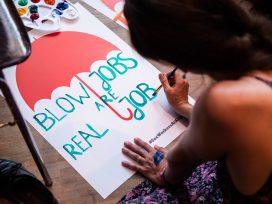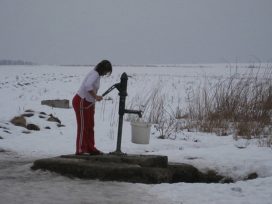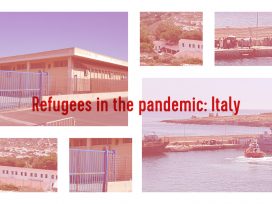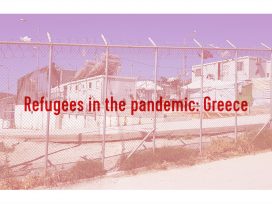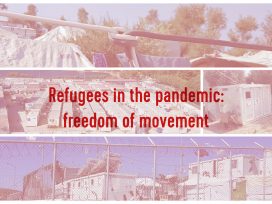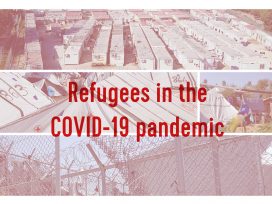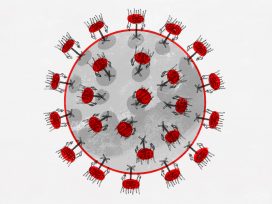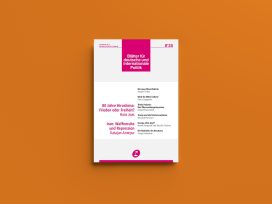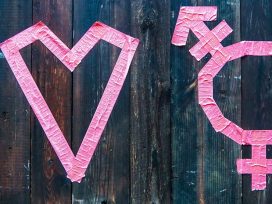Politics of abandonment
Refugees on Greek islands during the coronavirus crisis
Social distancing is impossible when 1200 people share a single tap. The Greek government is using the pandemic to segregate refugees from citizens but hasn’t provided the means for prevention. If this politics of abandonment continues, grossly overcrowded camps will become death traps. The Eurozine miniseries reports from Greece.
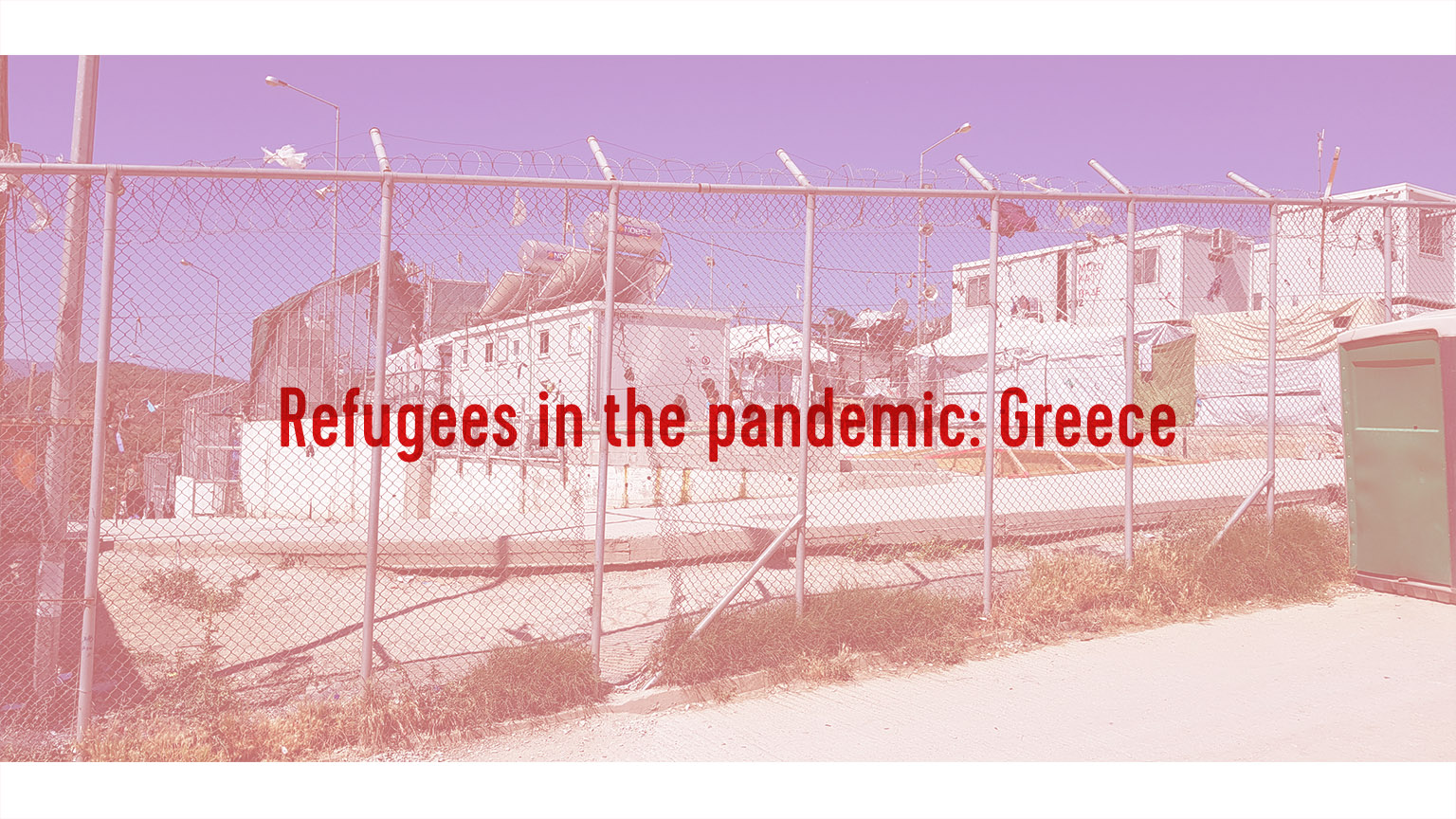 This article is the third part of our miniseries on refugees’ and asylum seekers’ situation in Europe during the COVID-19 pandemic. Read Bilgin Ayata’s introduction here, Chiara Pagano’s report from Italy here, and Kenny Cuper’s account on the restrictions of the freedom of movement here.
This article is the third part of our miniseries on refugees’ and asylum seekers’ situation in Europe during the COVID-19 pandemic. Read Bilgin Ayata’s introduction here, Chiara Pagano’s report from Italy here, and Kenny Cuper’s account on the restrictions of the freedom of movement here.
In many countries, the COVID–19 pandemic has made existing problems more transparent as if seen through a magnifying lens. This is also the case for Greece, where internal structural inequalities, the power dynamics in which the country is entangled, and the failures and shortcomings of past policies, have recently gained heightened visibility. Chronic public health system deficiencies, together with joint EU and national migration management policies have already led to an ongoing humanitarian crisis in refugee camps. Now the coronavirus is set to make matters worse.
Greece’s pre-existing harsh border and migration management policy has been further escalated over the past few months. The EU has legitimized these measures in the stated aim to ward off a second ‘migration crisis’. The Greek government’s response to COVID–19 in relation to refugee camps should be understood within the broader context of Greek and overall European migration policy. The combination of restrictive migration policies and a public health emergency not only puts the lives of refugees at severe risk but also exposes how these policies emanate from a politics of abandonment.
The crisis before the crisis
The rightwing party New Democracy was voted into office last July after having promised a national economic ‘return to normality’ and the confrontation with the issues of refugees and asylum, which Greece has been occupied with for five years now. More particularly, the government promised immediate measures to decongest ‘hotspot’ facilities on Greek islands, where refugees are held for prolonged periods of time while their asylum claims are being processed.
The government passed a new law on asylum to deliver this goal, which went into effect on 1 January. The law’s main aim is to speed up the asylum examination process. However, the government’s intended means are highly questionable and reveal its hardline stance on migration. For instance, the law minimizes the grounds on which an asylum seeker is deemed vulnerable, revoking any issues of severe mental disorders such as post-traumatic stress disorder (PTSD). At the same time, it imposes new procedural demands such as the legal representation of asylum seekers without providing adequate means; legal support for refugees is scarcely available from the state.
In addition, the proposed construction of new hotspots and re-purposed facilities on the Eastern Aegean Sea islands of Lesvos, Chios, Samos, Leros and Kos have caused an uproar. Both refugees and locals have strongly opposed the new construction work. The government responded to recent protests with severe police brutality. In the aftermath, some local rightwing extremist groups have spurned NGOs and refugees entirely. Nevertheless, the overall local resistance has been so strong that the government withdrew its special police forces and has put its construction plans on hold.
Then, just as government plans seemed to be hanging by a thread, a new border crisis arose: thousands of refugees had gathered at the Greek-Turkish land border along the Evros river after Turkey reopened its borders. Subsequent events were portrayed as an ‘invasion’ by the Greek government and their response was commensurable. Throughout March, but especially during the first 15 days, riot police and border guards engaged in a series of militarized operations during which salves of tear gas were exchanged over the border lines from both sides. Refugees who arrived in Greece were met by extreme police brutality, fast-track trials and imprisonment, arbitrary detention and an acceleration of the already existing practice of push-back operations to Turkey. In an unprecedented move, the Greek government then suspended the right to request asylum throughout March. During the height of the Evros border tensions, the president of the European Commission, Ursula von der Leyen, together with a group of high ranking EU officials visited the region. The dignitaries praised the Greek government for safeguarding European borders and promised 700 million euros of economic assistance for Greece for migration management and border control.
It was during this period that the discussion of COVID-19’s impact also reached Greece. The intersection of these developments became a conducive opportunity for the Greek administration to legitimize its previous plans to segregate refugees in closed camps and enforce more restrictions.
National responses to COVID–19
From 10 March, the Greek government imposed a set of strict measures to flatten its coronavirus infections curve, hoping to gain time for healthcare preparations. This time is direly needed in Greece, given the radical neoliberal austerity cuts to public services throughout the past decade. A major outbreak of the pandemic would indeed pose high-level challenges.
Key steps prohibit large gatherings and otherwise aim to limit congestion and over-crowding. Internal travel bans have also been imposed. Since 21 March, for example, no travellers have been allowed to board ferries for the Aegean islands, a move intended to prevent travel from the mainland to holiday homes for the lockdown. Although no governmental official is likely to publicly admit deficiencies in healthcare provision, it is well known that peripheral public health structures, especially on the islands, have been hit hardest by austerity measures. Hospitals lack basic equipment and many specialists are nowhere to be found. According to the latest announcement by the Hellenic Federation of Public Hospital Workers, Chios’s hospital does not have a single Intensive Care Unit (ICU) bed. The same island has the EU’s third largest hotspot facility accommodating 5,600 refugees. Lesvos reportedly has only six ICU beds. In case of an outbreak, so few beds would have to serve 86,436 local people and 21,151 refugees living in the Moria hotspot camp and other Lesvos refugee hosting facilities.
An island travel ban would appear to be a reasonable virus containment measure, yet it is also a paradigmatic example of differential treatment of citizens and refugees. While Greek citizens are requested to stay at home and avoid large gatherings, refugees are forced into exactly the opposite situation. They live in overcrowded camps with no sanitation nor medical infrastructure; self-isolation is an impossibility.
Over 40,000 refugees are currently being detained in five hotspot facilities on Lesvos, Chios, Samos, Leros and Kos. These hotspots were set up from 2015 onwards as an EU response to the high numbers of arrivals. They are administered by Greece yet financed by the EU. Even though these hotspots were introduced as a temporary emergency measure, they have become permanent facilities where those who newly arrive are detained and then trapped for several months, even years. At present, these hotspots constitute the largest refugee camps in Europe.
Living conditions in hotspot facilities before the pandemic
While each hotspot facility has its own particularities, a chronic lack of basic infrastructure is systematic throughout. The dehumanizing conditions in camps have been extensively criticized in reports by academics, NGOS and journalists for years now. The chronic deficiency of basic health and sanitary infrastructure cannot simply be accorded to mismanagement, intense numbers and lack of resources. More than four years into their operation, basic needs like food provision, shelter, sanitation, education and medical care have not improved but worsened. This raises the question as to whether this situation is not only tolerated, but also used to intentionally discourage more arrivals.
The numbers speak for themselves. The Reception and Identification Center of Lesvos, commonly known as Camp Moria, that was built for 2,757 currently accommodates 18,985; it is operating 6.8 times over its capacity. The majority of refugees are living in olive groves adjacent to the camp in self-made shelters and tents. Those who live outside the camp share its facilities with those inside living in Isoboxes and tents.
While occupancy has grown considerably over the years, infrastructure has not been adjusted accordingly; access to water, toilets and showers is extremely limited. In Camp Moria, for example, one tap is shared by 1,300 people and 200 people are expected to share one toilet. Isoboxes should cater for no more than 4 people but are often being shared by more than 12 occupants. Families live in cramped three-square-metre spaces and a few hundred people live in large tent structures known as rub halls.
Access to medical support, which is of utmost importance to refugees fleeing warzones and persecution, is wholly insufficient. Under-staffing, insufficient funding of the national medical provider and numerous bureaucratic obstacles often leave hotspots without any medical support. This was the case at several facilities we visited, where army doctors or NGOs were often attempting to cover the gaps.
Refugees spend hours and hours waiting in line to gain access to basic hygiene, food and water, healthcare, transportation or information regarding their applications. The daily hotspot experience is one of being confined in long queues in all weathers, wind, rain or sun. Even before the outbreak, NGOs were calling for camps to be closed and refugees relocated to the mainland. Rather than responding to these calls, the Greek government suggested building new camps on the islands as official, closed-door detention centres.
COVID–19 measures in the hotspot facilities
In direct contrast to social distancing for citizens, the Greek government is enforcing compression for refugees. While continuing to retain refugees in overcrowded camps, it has now also cut off NGO access. This major lifeline, which could have additionally helped prevent contagion, has been quashed. Even worse, in an attempt to separate newly arrived refugees from those already in the camps, the government has completely abandoned the former, who are deprived of shelter, food and medical support at their point of arrival.
Let’s take a concrete look at the latest measures regarding these hotspots. On 16 March, a Greek government representative announced that any person tested positive for COVID–19 in one of the five hotspots would be isolated within the camps. On the following day, the Ministry for Migration and Asylum announced a directive for all hotspot facilities. Additional measures were announced on 27 March.
The first directive includes twelve recommendations that are cosmetic in nature because they ignore the conditions that pose the main threats to contagion in the camps. For instance, ‘general hygiene rules’ such as the ‘daily cleaning of indoor communal areas with detergent and disinfectant as well as the continuous disinfection of door handles’ in public areas are suggested. Given that handles are as rare in the Moria camp as taps, which are needed to wash hands, this recommendation belittles rather than helps address the problem.
The main risk of infection in overcrowded camps is posed by cramped living spaces, lack of soap, water, toilets and showers, and long queues for food and services. These realities are not addressed in any effective way. Another recommendation is to supply food once daily so there will no longer be three food queues a day. However, social distancing is a physical impossibility in any case; if refugees were to keep a distance of 1.5 meters from each other even in the Moria food distribution queue, the line would be about 30 km long. It is exactly because these common recommendations for containing the virus cannot be employed in the camps that NGOs and the EU Parliament have called for the immediate evacuation of refugees. However, the Greek government remains steadfast in segregating the refugee population from locals.
Under the pretext of the pandemic, but essentially in order to enforce this sealing off, the following measures have been put in place. First, permanent police checkpoints have been set up on roads leading to the most overcrowded hotspot in Moria on Lesbos. These checkpoints affect both NGOs and refugees. Volunteers who want to access the facilities in order to provide help and support are blocked at these checkpoints. This endangers refugees all the more by suspending help when it is most needed. According to the latest report from inside Moria, most official staff have been avoiding or have been told not to perform their daily jobs in the facility. General tensions, sexual and gender-based violence, and inter-communal clashes may escalate all the more without outside assistance from NGOs and volunteers.
Gradual restrictions have also been imposed on refugees leaving the camps. First, refugees were only allowed to exit the facilities between 7am and 7pm for ‘absolutely necessary movements’, which have not been clearly defined. For example, it has not been specified if leaving the camp to take care of basic needs is considered absolutely necessary. In the case of the Samos hotspot, where 7,178 refugees live in a camp that was built for 648 people, there are no clothes washing facilities. Refugees need to go outside the camp to a launderette in the city, which is provided by an NGO.
The next level of sealing off the camps occurred on 27 March when the Greek government announced it would be cutting off cash assistance for recognized asylum seekers. For the past four years, these have been given on a monthly basis. The Ministry of Migration Policy justified this decision by saying that asylum seekers should not go into the city to withdraw money. The Ministry added that ATMs would be placed inside the hotspots instead, followed by grocery stores and other small shops. It should be evident that any suspension of monetary assistance in emergency strips refugees of the possibility to buy food and sanitary products such as soap. Given that monthly cash assistance is a legal prerequisite of the ESTIA programme carried out by the UNHCR and financed by EU funds (with funds from DG Home), even a temporary suspension of payments is cause for concern.
The government has decreed that twelve new medical units will be stationed around the perimeter of hotspots on Lesvos, Chios and Samos. The units will test for COVID–19 and be used to isolate any positive cases. It goes without saying that 12 units would be insufficient during an outbreak. Further healthcare provisions for refugees have largely been put on hold. Refugees in the hotspots are being urged to seek medical attention only if they have a fever and are coughing. Patients with chronic diseases, pregnant women and others in need of medical attention are once again left without assistance. In line with the general direction of lockdown measures, the official medical provider in charge has limited its action to informative posters to brief refugees on any new measures.
Therefore, it is not an exaggeration to say that refugees have been left alone to cope with both the pandemic and the omnipresent health risks. Instead of immediately seeking pragmatic solutions such as using the tourism infrastructure in the islands with currently empty hotels, the government has been focusing on isolating refugees within the camps. In fact, the proposal to accommodate refugees in the islands’ currently empty hotel facilities was initially suggested by activists but was picked up by Commissioner Johannson during the Committee on Civil Liberties, Justice and Home Affairs meeting on 2 April. Although the European Commission is reportedly working on an action plan with the Greek government in this regard, so far it has remained rather silent on the issue. Only the proposed resettlement of 1,600 unaccompanied minors has been highlighted as a future concrete action.
Border Security or Human Rights?
At the time of writing, several COVID–19 cases have been confirmed in refugee camps in mainland Greece. The government has reacted by placing entire camps under quarantine, forbidding anyone from entering or exiting. So far, no evacuation operation has been carried out, not even for the most vulnerable.
The Greek government’s coronavirus measures for refugee camps are driven by its political agenda, restricting migration rather than prioritizing the protection of all. In denying the reality of hotspot living conditions and displacing the responsibility for refugee care onto those unable to self-isolate, wash their hands and disinfect public spaces, the government’s preventative measures have become a rhetorical exercise. So far it has only reinforced measures that further segregate refugees.
If this politics of abandonment continues, overcrowded camps will become death traps. The European Commission, which has so far imposed and financed island hotspots shares responsibility for any human costs resulting from these encampment policies.
Over the past few years, prioritizing European border security at the expense of human rights has resulted in a humanitarian crisis in the camps on the islands. The situation worsened after the new government was elected in 2019. Its hardliner anti-migration policies have been given even more leverage through EC support during the Evros land border escalation. We are now witnessing how prioritizing border security over human rights is becoming an even more dangerous game.
The EU’s migration policy has clearly reached a dead end. Urgent action is needed, before it becomes a deadly end. A growing movement across Europe is protesting against the politics of abandonment by highlighting the paradoxes of spending millions for the repatriation of holiday makers while leaving refugees behind. The voices of critique have found some echo in the EU Parliament, and seem to modestly reach also DG Home. This is the right time for a turn to move away from the politics of abandonment towards an understanding of protection and care that erases the difference between the citizen and noncitizen.
This article is the third part of our miniseries on refugees’ and asylum seekers’ situation in Europe during the COVID-19 pandemic. Read Bilgin Ayata’s introduction, Chiara Pagano’s report from Italy and Kenny Cuper’s account on the restrictions of the freedom of movement.
The miniseries is the result of a co-production with the research project ‘Infrastructure Space and the Future of Migration Management: The Case of the EU Hotspots in the Mediterranean Borderscape.’
The limits of protection, prevention and care
A miniseries on refugees in the COVID-19 pandemic
From national threat to oblivion
Erasing migrants from public discourse in Italy during COVID-19
Contagion and containment
Curtailing the freedom of movement in times of coronavirus
Published 14 April 2020
Original in English
First published by Eurozine
© Bilgin Ayata / Artemis Fyssa / Research Project ‘Infrastructure Space and the Future of Migration Management: The Case of the EU Hotspots in the Mediterranean Borderscape’ / Eurozine
PDF/PRINTIn focal points
Newsletter
Subscribe to know what’s worth thinking about.
Related Articles

Nine years ago, a slim majority of UK voters chose to leave the European Union – without a clear plan or the tools to make it happen. Five years after the de facto departure, relations are slowly being repaired, driven in part by the increasingly unpredictable political climate in the United States.

Since the collapse of Novi Sad’s train station in November, student-led protests have erupted across Serbia, inspiring a nationwide movement against corruption.
